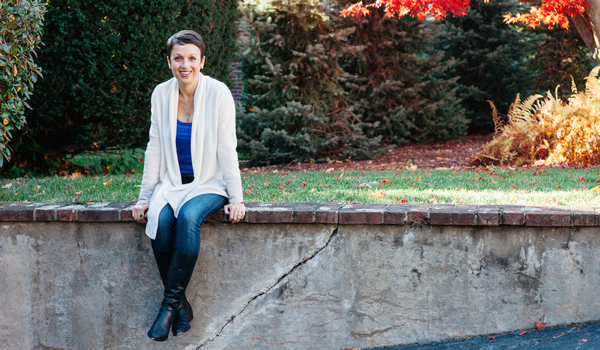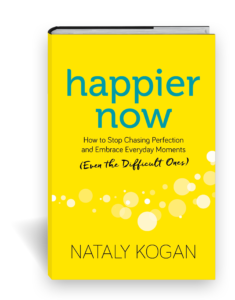Note: This is a guest post from Nataly Kogan, author of Happier Now.

In the summer of 2017, I traveled to Tanzania to give workshops to the two hundred girls who study at SEGA (Secondary Education for Girls’ Advancement) Girls’ School. These girls come from extreme poverty, and many of them lost one or both parents to malaria, AIDS, or other diseases. While the school provides them with room and board, in addition to an excellent education, these girls don’t have any extras—no toys, games, or books other than those in the school library.
And yet they’re so deeply grateful for everything they have.
During one of our Happier workshops, I asked the girls to write something they were grateful for on the huge pieces of papers we had taped around their outdoor cafeteria. Here are just a few examples of what they wrote:
I’m grateful that we have peanut butter at the school.
I’m grateful that I have both of my parents (mother and father!!!)
I’m grateful to have good teachers who care about me.
I’m grateful because I have all my basic needs met at the school!
I’m grateful that we have computers.
I’m grateful because I am alive.
These girls are deeply grateful for the very basic things many of us take for granted.
Because they have experienced such intense poverty, things like a safe and clean shelter, food, and access to education are extraordinary to them. But most of us don’t have the same perspective and take our basic needs for granted, and if we do appreciate these “basics,” our appreciation is fleeting.
After my parents and I fled the former Soviet Union when I was thirteen, we lived in refugee settlements without much food, comfort or certainty about the future. It was a difficult experience I’ll never forget.
Yet, as I sit in the kitchen of my comfortable home outside Boston with a fridge full of food, I catch myself being annoyed that we don’t have enough counter space. And then I chide myself for being anything but grateful for all I have.
The blessing and the curse of the human brain is that it’s good at adapting—to the good and the bad. Once it adapts, we’re used to what we have. Rather than being in awe of being alive, of having food, water, and shelter, we take them as givens. And then we want more.
Adaptability can lead to taking for granted the good already present in our daily lives. This is precisely why practicing gratitude and appreciating what we have, big and small, can help us overcome what I call the curse of the moving baseline. It’s the reason why our attempts to find genuine happiness through achievements usually fail.
Your moving baseline might go something like this: You feel undeniably confident that when you get a promotion, finish a big project, or lose ten pounds you’ll be happy. You work hard. You get the promotion. You lose those ten pounds. You finish the project. You feel amazing!
But shortly after your brain adapts, and your accomplishment now seems unexceptional. You don’t get that jolt of joy like you did when you first accomplished your goal. What’s worse, your brain’s negativity bias kicks in and you begin to notice everything that is wrong with the very thing that you were certain was your path to blissful happiness.
The minute we expect something to be a certain way we rob ourselves of the chance to delight in what we have.
The girls I met at the SEGA School in Africa were some of the most joyful people I’d ever encountered. They’re living examples that if we can practice not taking even the most basic things for granted, life becomes a series of miracles. We can feel joy in the most mundane moments. The everyday becomes the extraordinary. We get to spend more time in the Valley of Joy.
Practice: Imagine Life Without This
Think of something in your life that you tend to take for granted. It can be as simple as running water or groceries in your fridge, or that you get to listen to music you enjoy or read books that inspire you. Now consider, for a moment, what your life would be like if you didn’t have it?
Especially at times when I find myself caught up in thinking about how something is not quite right—flight is delayed, garage door is broken—I remind myself to pause and think: Imagine life without this. It doesn’t mean I don’t ever want anything or wish for something to be better, but this simple exercise fills me with deep gratitude for the many amazing things that do fill my life, and it offers a helpful way to prioritize where I spend my emotional energy.
***
 Nataly Kogan is the author of Happier Now: How to Stop Chasing Perfection and Embrace Everyday Moments (Even the Difficult Ones) that comes out on May 1, 2018. I have read it—you’ll enjoy it.
Nataly Kogan is the author of Happier Now: How to Stop Chasing Perfection and Embrace Everyday Moments (Even the Difficult Ones) that comes out on May 1, 2018. I have read it—you’ll enjoy it.
from Becoming Minimalist https://ift.tt/2r9Uhvc
Aucun commentaire:
Enregistrer un commentaire